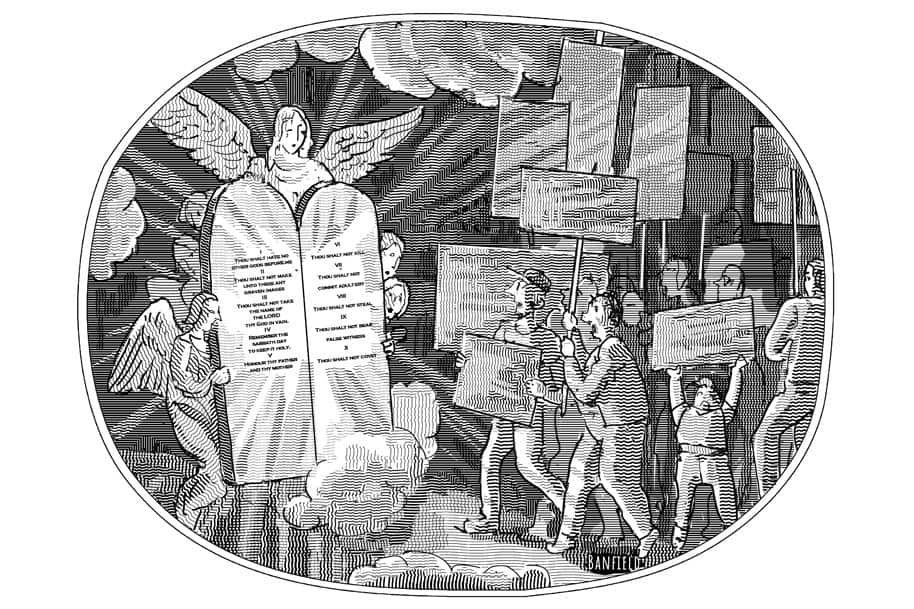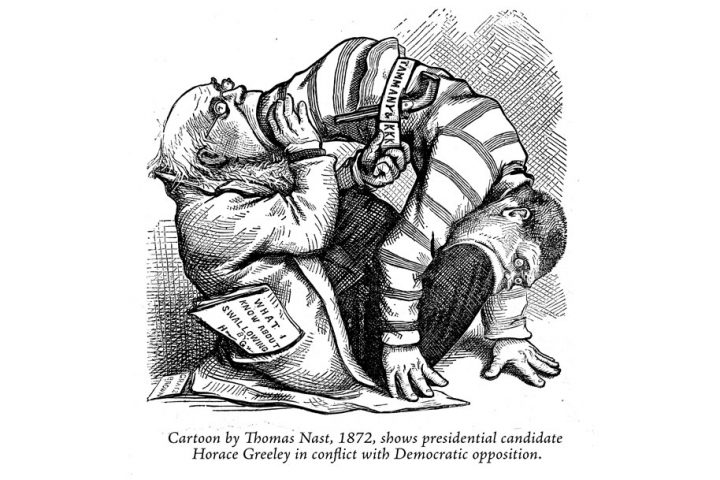Book Reviewed
American and European conservatives share little in common. American conservatives look to the founding of their country for their principles and precepts—to the Declaration of Independence, to the Constitution and our basic political institutions, and to the thinkers, like John Locke, who inspired them. They cherish natural rights, limited government, and individual autonomy—intellectual products of early modern enlightenment thought. Their mission, as George Will observes in The Conservative Sensibility (2019), “is to conserve, by articulating and demonstrating the continuing pertinence of, the Founders’ thinking…. American conservatives are the custodians of the classical liberal tradition.”
Most European conservatives, in contrast, seek to conserve a pre- or counter-Enlightenment tradition. French political philosopher Pierre Manent’s Natural Law and Human Rights is most definitely an instance of European conservatism. For him natural rights are the problem, natural law the solution. His book is an attempt to reestablish and revive the centrality of natural law and to diminish or suppress natural rights—and, even more, human rights.
***
Natural Law and Human Rights calls into question most of what we moderns are committed to and believe true about politics and morality. The way we think—in terms of human rights—is poorly grounded, as is our rejection of natural law according to the author, who is retired now from teaching many years in Paris’s École des Hautes Études en Sciences Sociales. Human rights and natural law, Manent believes, are opposing ends of the moral and political see-saw. Natural law, stemming from medieval Catholicism and Roman antiquity, is presently excluded “from public debate as supposedly archaic and because it is supposed to pose an obstacle to the recognition and implementation of human rights.” Manent aims to shift the see-saw so that natural law becomes ascendant.
At the heart of our human rights regime is a “Great Contradiction.” “[O]n the one hand,” Manent writes, “we hold that human rights are a rigorously universal principle, valid for all human beings without exception; on the other, we hold that all ‘cultures,’ all ways of life, are equal and that any tendency to judge them…would be a form of discrimination, and thus that any judgment…would be an attack on human equality.” So, the “woke” frequently reprove “Christians who publicly express reservations about ‘LGBT rights’” but condemn those who apply the same standard to Muslim societies. This contradiction produces a “weakness of judgment” and “an insurmountable perplexity that tends to paralyze collective action.” Natural law is necessary to overcome that perplexity and provide “a solid basis for exercising practical judgment.” Thus the significance of Manent’s subtitle: “Toward a Recovery of Practical Reason”—a revealing statement of his aim.
***
Much is familiar in this book: the cardinal distinction between ancients and moderns; Niccolò Machiavelli’s firing the opening salvo of modernity; Thomas Hobbes’s advancing Machiavelli’s gambit through the notions of rights and the state of nature; our present situation as the working out of what they wrought. But Manent’s emphases and narrative are less familiar. As Manent tells it, the decisive shift from natural law to human rights followed from our loss of orientation by practical reason, or the loss of the perspective of action. The natural human orientation is practical—we ask, “[w]hat is to be done?” Beginning with Machiavelli, modern thought replaces that perspective with an outside observer’s stance toward human action, which leaves thinkers “incapable of and little interested in entering into the agent’s reasons.”
Manent provides an original and striking interpretation of the most famous passage of Machiavellian prose—the statement in chapter 15 of The Prince on the gap between what men do and what they ought to do. Humans believe they ought to act in certain ways, but in fact they act (apparently unknowingly) quite differently. Machiavelli looked beyond or beneath what men think they do to what they actually do and to what impels them to the doing. He replaced “practical action…with theoretical action,” comments Manent, “that is, action as it can be seen, action as it can be taken into view wholly by the theoretician and that therefore is not obscured or confused by the agent’s point of view.”
Beneath the agent’s reasons for acting Machiavelli discovered fear as the true force that binds humans—that socializes or politicizes them. Replacing the concrete practical motives of the acting man with the abstractions of an outside observer opened the way for the dominance of the theoretical or scientific perspective. Manent argues that this perspective finds fuller expression in Hobbes—and here Manent breaks with Leo Strauss’s insistence that Hobbes does not rest his political philosophy on scientific or metaphysical grounds.
The conception of the individual that accompanies this thought system “proceeds from modern metaphysics”—from Hobbes’s notion of “endeavor” or “conatus.” Hobbes derived this notion from “reflection or speculation on natural movement or dynamism in general.” The end of conatus—striving or motion—is to remain in motion. In human terms, our greatest threat is the cessation of motion in death. From this, we can deduce the two springs of all human behavior: fear, and striving for power (to avoid death).
***
Observing the human things from the outside produces a stripped-down notion of humanity. Understanding man as conatus results in the Hobbesian state of nature as man’s “natural state.” This state consists of “individual[s] considered as distinct and separate by nature itself from other individuals, the individual as individuated by his biological nature, his nature as a living being.” Manent concisely summarizes: man “is this unit of life and quantity of being that wants to continue to live and to persevere in being.” Humans so conceived are perfectly equal, because they have been bleached of “all complexity or inner fullness.” This construct intentionally ignores the differentiating characteristics of actual humans, and therefore “has nothing to teach us concerning the human beings that we are.”
The state of nature models this notion of human nature in its individuated separateness. With the loss of all specifically human qualities, natural law as traditionally understood is rendered moot, for “natural law issued commands in the name of a teaching implicit in human nature, in a tendency of human nature to society and to knowledge, or in a natural difference among ages, sexes, and capacities, a tendency or difference that reason once made explicit and on the basis of which it founded its commandments and recommendations.” The rejection of the naturalness of human differences leads to an assault on nature that Manent finds particularly troubling, as in the movement for same-sex marriage.
Natural rights were meant to replace natural law in guiding our practical judgments. But law guides or commands; right, in contrast, is permissive—a kind of claim to freedom to do…whatever. Modern “rights…have no meaning except openness to an unlimited authorization of actions or behaviors with no rule or purpose.” Natural right largely reflects the absence of nature as a source of guiding norms. Being so thinly natural, such rights readily transformed into human rights, grounded not in our shared nature but in our radical individuation.
A large part of Manent’s refutation of the modern outlook consists in his effort to remind us of what it so deeply misses. In particular, he wishes to remind us of the inescapability of the practical perspective. Although we can hear Thomistic echoes in Manent’s analysis from time to time, the core of his effort to revive natural law is quite different. Indeed, he seems deliberately to reject a Thomist revival, that is, an effort to advance “theoretical and synthetic propositions concerning human nature or the nature of the human world.” Such an effort “remains a prisoner of the theoretical view that it shares with the philosophy of rights.”
***
Manent takes another path—the path of the practical perspective that Machiavelli and Hobbes eschewed. Every “action properly so called,” Manent claims, “requires a balancing of the three main human motives, that is, the pleasant, the useful, and the honest,” which he interprets to include the just and the noble. These motives are natural—they are the natural promptings of our action. They point us to ends or objects of action instead of “the behaviors with no real purpose” authorized by modern rights. Natural law guides us toward the proper balancing of these motives. One consequence of Manent’s approach is that natural law is no rigorous set of unyielding and universal rules, but flexible and circumstantial. Perhaps this approach is meant to avoid the critique put forward by Strauss in his preference for natural right in the Platonic or Aristotelian sense; perhaps it is an attempt by Manent to formulate a doctrine more attractive to a modern audience.
Whatever his aims, Pierre Manent’s presentation is rather disappointing. For a book attempting to revive practical reason it has little concretely practical in it. We hardly see the natural law method at work. Here and there Manent suggests mandates that are natural law commands, but we do not see how he draws them from the motives of human action. Same-sex marriage is apparently against natural law, for example, but it is not clear how the motives of the pleasant, the useful, and the honest lead to that conclusion. It is also not established that these are the motives of human action. This is, of course, not to conclude that Manent cannot supply arguments to fill these gaps, but it is to say that this slender book has not done so. Natural Law and Human Rights would greatly benefit from a sequel in which Manent undertakes the derivation of natural law from the motives of action he has identified.





